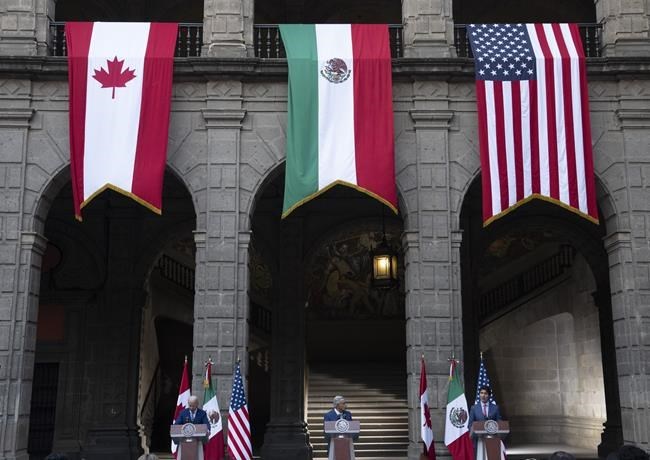WASHINGTON — Canada might be outmatched by the U.S. on raw spending power, but retooling the way Ottawa signs off on infrastructure projects could help it gain ground in the race to build North America's green economy, industry leaders say.
But the federal government had better hurry: lawmakers on Capitol Hill already have the same idea.Â
Resource companies are less attracted to monetary incentives than they are to the decidedly less sexy idea of regulatory consistency and predictability, TC Energy president and CEO François Poirier said Monday.
Given the choice of whether to deploy resources in Canada, the U.S. or Mexico, "the size of the incentives is not the determining factor in my decisions," Poirier told a gathering of business executives in Washington, D.C.
Factors like consistent timelines and permitting criteria for any given project are decidedly more attractive to stability-craving companies than the multibillion-dollar subsidies on offer in the U.S., he said.Â
And it may only be days or weeks before the U.S. catches up, if a permitting reform bill from West Virginia Sen. Joe Manchin ends up part of any forthcoming deal between Republicans and the White House on the debt ceiling.Â
"While Canada and Mexico are pondering how to achieve parity or close to parity with the U.S. to attract capital to be invested in energy, the U.S. has already moved on to the realization that permitting reform is critical," Poirier said.
"My advice to our Canadian government and to the government in Mexico would be to provide as much certainty as possible with respect to permitting."
President Joe Biden is scheduled to meet with House and Senate leaders Tuesday to talk about the impasse over the debt ceiling, a legislative threshold that restricts the government's borrowing power.
The U.S. could hit that limit early next month, fuelling the prospect of a default, a catastrophe that would plunge the country into a deep recession, end millions of jobs and shake economic foundations around the globe.Â
Media reports suggest the contours of a deal could be taking shape this week — a deal that would include passage of Manchin's permitting reform bill, which would streamline U.S. approvals for energy and infrastructure projects. Â
"If we are to achieve our ambitions for emission reductions by 2030, we only have a couple of years where we can make meaningful change and implement that change in time," Poirier said.Â
"Speeding up regulatory processes — but also, more importantly, making them predictable and consistent among the three jurisdictions — is really what's necessary for all of those countries who are competing with the U.S."
A unified economic front was a key theme of the North American Business Summit, a trilateral gathering of executives hosted by the Business Council of Canada, the U.S. chamber and the U.S.-Mexico Foundation.Â
Central to that goal must be ensuring the continued survival of the U.S.-Mexico-Canada Agreement, which replaced NAFTA in 2020, said U.S. Chamber of Commerce CEO Suzanne Clark.Â
The USMCA, known in Canada as CUSMA, is as much about Western values as it is about growth, Clark said as she urged her audience to ensure the agreement survives.Â
Unlike its predecessor, the USMCA includes a sunset clause that requires all three countries to sit down for a comprehensive review every six years to ensure all parties are still satisfied.Â
That deadline is still three years away, but the time is now to stand up and defend the agreement — not just for shared economic prosperity, but for the sake of democracy itself. Â
"If we, together, don't define global leadership — if we don't lead on global challenges and meet the opportunities of the future — others like China and Russia will fill that void," Clark said.Â
She acknowledged the ever-present "irritants" that continue to prompt questions about just how committed the three countries are to both the letter and the spirit of the deal.Â
In the 33 months since USMCA went into effect in July 2020, 17 disputes have been launched, compared with a total of 77 initiated over the course of NAFTA's 25-year lifespan.
The U.S. remains unhappy with how Canada has allocated the quotas that give American dairy producers access to markets north of the border. Canada and Mexico both took issue with how the U.S. defined foreign auto content. And Canada and the U.S. oppose Mexico favouring state-owned energy providers.
"We have to resolve these issues not only to prove that USMCA works, not only to fill the potential of the deal, but also — most importantly — to prove that we can do it, that we are committed to making this agreement strong," Clark said.Â
She didn't mention Donald Trump by name, but the former president, the principal instigator of the effort to renegotiate NAFTA, is already the perceived front-runner for the 2024 Republican nomination.Â
Whatever the threat to the USMCA, be it an unfriendly U.S. administration or a politically fraught review process, it's vital that "the economic case is indisputable, that no one can say this agreement isn't maximizing North American competitiveness."Â
The agreement underpins the ability of the three countries to collaborate on priorities like food and energy security, resilient supply chains, transparency, stability and due process, she added.Â
"When these factors are not present, investment can't thrive, the economies cannot grow, jobs cannot be created and we do not enjoy prosperity," Clark said.Â
"When they are absent, corruption thrives, ambiguity reigns, investment dollars flee and tax revenues plummet."
This report by The Canadian Press was first published May 15, 2023.
James McCarten, The Canadian Press




